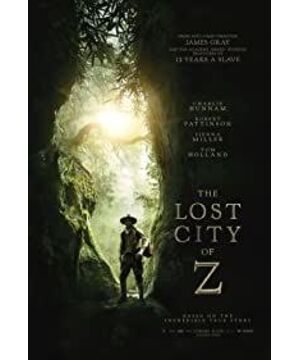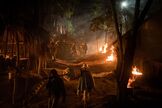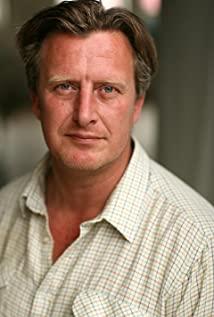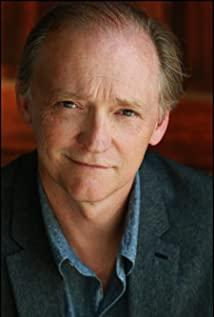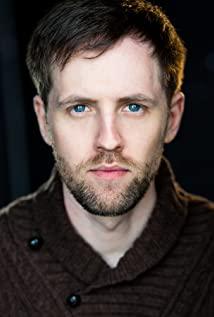one
"The Lost City of Z" is not a movie made to please audiences.
As a biographical adventure film, director James Gray boldly gave up the tried-and-true routines such as gripping stories, twisting and bizarre character fates, thrilling action scenes, fancy and sharp editing, and replaced them with unhurried narrative rhythm, calmness Restrained photo editing and an ambiguous ending to the story.
For the audience who came to watch the movie with the mentality of "drinking carbonated beverages", they only had a cup of warm water in the end, and they inevitably felt a little deceived.
Just because it doesn't please the audience doesn't mean it's not a good movie.
"The Lost City of Z" has the dual temperament of classical elegance and bold rebellion. All tensions and conflicts are arranged in an orderly manner by the director. On the surface, it seems anti-routine, anti-narrative, anti-climax, and somewhat like a running account. Below the movie.
The plot of the movie is very simple: Major Fawcett left his wife and children in order to restore the family honor, and led his deputy, Kirsten, and others to go deep into the mysterious Amazon rainforest to conduct exploration work, and accidentally discovered evidence that the mysterious ancient city Z once existed. Under the mistrust of the world, he entered the rainforest several times to find Z city without success, and disappeared mysteriously in the last rainforest expedition with his son Jack, and has never been heard from again.
In real events, no one knows what happened to Fawcett and Jack in the last moments of their lives.
At the end of the film, the director gave this picture: After Fawcett and Jack were kidnapped by local natives and fed psychedelic drugs, they were both carried into the Amazon River and disappeared into the darkness. Whether they were used as sacrifices by the indigenous people, or whether they survived and integrated with the local people, we do not know.
Uncertainty fills the film with poetic atmosphere and mystery, as Fawcett puts it: "A large part of life is a mystery."
two
"The Lost City of Z" has a solid character.
The charisma of Major Fawcett and the rest of the characters is like a raft, carrying the audience's attention slowly across this relatively loosely structured river of stories.
At the beginning of the film, Major Fawcett's life is plagued by the family's poor reputation. Even if he wins the deer hunt, he cannot get the respect he deserves at the reception.
He is eager to restore his honor, and it is precisely because of this that he is willing to leave his hometown and embark on a perilous journey to explore the Amazon.
The author did not deliberately portray Fawcett as a greedy person who could abandon his wife and children without blinking his eyes for honor. Such a role setting violates ethics and morality. Even if the characters undergo a huge reversal in the back, it is difficult to gain audiences. psychological identity.
He is heroic and righteous in his bones, and upholds the dignity of a soldier. In saying goodbye to his wife, he said it was a huge sacrifice for both parties, but it was worth it.
When a group of people killed each other due to food shortages in the Amazon basin, he still held on to the remaining light of civilization: "Control yourself! We are not savages!"
Although Fawcett lived in the world-famous empire where the sun never set, he went to and from high-end cocktail parties, and interacted with the jazz ministers, but his mind was equal and enlightened. Seeing the slashes on the slave's body, he would cast a sympathetic look.
Nor would he be disappointed to discover a civilization older than European civilization. Instead, he couldn't wait to tell the world the news. That wonderful war of words was a fierce collision between Fawcett's enlightened thinking and the conservative thinking of the mainstream of British society.
In the face of the ancient tribal civilization, he did not raise the air of capitalist civilization like Mr. Murray, and never advocated the use of force to subdue the aborigines like the previous colonists. He chose to approach these civilizations with an equal and friendly attitude, and to understand the folk customs of the local people. Perhaps they have the key to unlocking the secrets of City Z.
In Fawcett, we can see a spirit of idealism, he dedicated his life to the ideal, and he does not even know whether this ideal is a false proposition.
The witch once said to him: "Your soul will never rest until you find the lost city, which is your destiny." The director gave the idealist an idealized ending - he was lighting the fire and slowly The river calmly accepted his fate.
Even death has become part of the pursuit of dreams.
three
Mrs. Fawcett's footnote in her life was "sacrifice".
Behind a hero stands a woman who silently supports him. Her husband, Fawcett, needed to fill in the absence of the children's childhood growing up. Not only does she have to bear the pressure of raising her children and endure the long separation from her husband, but she also always cares about her husband's life in danger.
But she has no complaints. When her husband returned from his first expedition to the Amazon and was warmly welcomed by the people, she just stood silently in the cheering crowd watching her husband.
It's not hard to see the feminist light in Mrs. Fawcett.
She once told her husband that she was an independent and self-reliant woman. She always believed in equality between men and women, and even asked to accompany her husband to Amazon. The husband does not allow it. He can only admit that men and women are equal in thought, but not physically. But Mrs. Fawcett believes that the pain of having a child far exceeds the torment of her husband in the Amazon.
The character traits of other characters, such as Mr. Kirsten's loyalty, Mr. Murray's hypocrisy, and Jack's vigor, are all reasonably described by the director's pen and ink.
Four
The director also clearly sets several layers of conflict under the calm and slow narrative.
The first level of conflict is family conflict. For an idealist called from afar, family may be his greatest bond. In the film, Mr. Fawcett is a qualified explorer, but not a qualified husband and father - between ideals and reality, he chose the ideal without hesitation, but let his wife endure the pain of loneliness, and also the children. They grew up as that "absentee" in their childhood.
Fawcett's departures made the rift between him and the children's hearts deepen, and the conflict finally broke out on the eve of his upcoming military service for the country.
Young Jack believes that his father is not responsible for the family, all he cares about is honor. Jack's words angered the father, and Fawcett believes that the son's misreading of himself is more painful than the physical pain he suffered in the Amazon jungle.
The conflict between father and son was resolved after the war, and Jack eventually became an explorer like his father.
If the conflict between Fawcett and Jack is explicit, then the conflict between Fawcett and his wife is invisible.
All along, Mrs. Fawcett has been making unilateral sacrifices for her husband and the family. She may be dissatisfied, but every time she faces her husband who has returned from afar, she still smiles. Until the end of the film, Fawcett, who is in his twilight years, wants to explore the Amazon with his son Jack. Mrs. Fawcett said that she should be angry now, but she did not.
At this moment, she had admitted the fact that Fawcett was an explorer chosen by God, and he was destined to use his own sacrifice to leave a mark on the world. "Exploration" is her husband's genetic code. And now, this has been passed on to his son by blood. She had to say, "Do I have any other choice?"
The so-called resolution of conflict is not about who is willing to sacrifice for the other party for free, but the two parties finally reach a consensus on an unchangeable fact and accept it calmly.
The second level of conflict is the clash of civilizations. When Fawcett saw the spectacle of "savages" reclaiming the rainforest, he couldn't help but comment that his civilization was "too arrogant and arrogant." Indeed, the twentieth century was perhaps the best era of the British Empire. They claimed to have the most advanced civilization in the world, and would never admit or allow the existence of other civilizations that took precedence over them—especially since this civilization originated in the wild land of the Amazon.
On the one hand, the industrial revolution in full swing has promoted the process of the whole world, but it has caused irreversible destruction to the natural environment; on the other hand, the indigenous people in the rainforest follow the laws of nature and live like their ancestors thousands of years ago. - You cannot judge the superiority of two civilizations.
As a witness of two very different civilizations, Fawcett chooses to be inclusive, while others show the audience the fragility of civilization and the deplorability of humanity.
When Fawcett stepped into the dangerous rainforest for the second time, Mr. Murray, who was in a desperate situation, chose to steal the food reserves of the other team members. In the face of survival, the dignity of the most civilized man has disappeared, and he has degenerated into a "barbarian", which is also a kind of irony.
The third level of conflict focuses on the conflict between idealists and reality. Idealists dedicate their lives to the pursuit of a faint fire of hope. Their hearts are too pure, their life trajectory is too dazzling, and reality is often incompatible with these people.
When Fawcett faces the accusations of the brazen Mr Murray and is asked to apologize on the spot, the idealistic soul does not allow him to bow his head to reality, even if it is against the dignitaries in the inner circle of power. He is like a mirror, not only to shame the opportunists, but also to shine the light of humanity that remains in troubled times.
five
After watching "Lost in Z City", I remembered a sentence Tao Yuanming wrote in "Peach Blossom Spring": "It's not enough for outsiders."
In that fiery age, Z City was that peach blossom garden, a place of pilgrimage that idealists like Fawcett yearned for. We hope that at the end, Fawcett did not die, but after being fed psychedelics, he lost his previous memory, and really lived in Z City for a long time, integrating with the Amazon rainforest.
This is the true home of an idealist.
This spirit cannot be spoken to outsiders.
Welcome to pay attention to the personal public account "iSeaCat", and update film reviews from time to time.
View more about The Lost City of Z reviews


